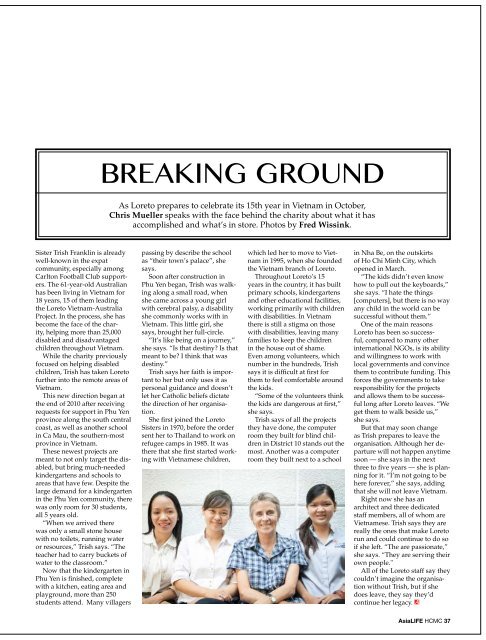issue 54 - AsiaLIFE Magazine
issue 54 - AsiaLIFE Magazine
issue 54 - AsiaLIFE Magazine
You also want an ePaper? Increase the reach of your titles
YUMPU automatically turns print PDFs into web optimized ePapers that Google loves.
BREAKING GROUND<br />
As Loreto prepares to celebrate its 15th year in Vietnam in October,<br />
Chris Mueller speaks with the face behind the charity about what it has<br />
accomplished and what’s in store. Photos by Fred Wissink.<br />
Sister Trish Franklin is already<br />
well-known in the expat<br />
community, especially among<br />
Carlton Football Club supporters.<br />
The 61-year-old Australian<br />
has been living in Vietnam for<br />
18 years, 15 of them leading<br />
the Loreto Vietnam-Australia<br />
Project. In the process, she has<br />
become the face of the charity,<br />
helping more than 25,000<br />
disabled and disadvantaged<br />
children throughout Vietnam.<br />
While the charity previously<br />
focused on helping disabled<br />
children, Trish has taken Loreto<br />
further into the remote areas of<br />
Vietnam.<br />
This new direction began at<br />
the end of 2010 after receiving<br />
requests for support in Phu Yen<br />
province along the south central<br />
coast, as well as another school<br />
in Ca Mau, the southern-most<br />
province in Vietnam.<br />
These newest projects are<br />
meant to not only target the disabled,<br />
but bring much-needed<br />
kindergartens and schools to<br />
areas that have few. Despite the<br />
large demand for a kindergarten<br />
in the Phu Yen community, there<br />
was only room for 30 students,<br />
all 5 years old.<br />
“When we arrived there<br />
was only a small stone house<br />
with no toilets, running water<br />
or resources,” Trish says. “The<br />
teacher had to carry buckets of<br />
water to the classroom.”<br />
Now that the kindergarten in<br />
Phu Yen is finished, complete<br />
with a kitchen, eating area and<br />
playground, more than 250<br />
students attend. Many villagers<br />
passing by describe the school<br />
as “their town’s palace”, she<br />
says.<br />
Soon after construction in<br />
Phu Yen began, Trish was walking<br />
along a small road, when<br />
she came across a young girl<br />
with cerebral palsy, a disability<br />
she commonly works with in<br />
Vietnam. This little girl, she<br />
says, brought her full-circle.<br />
“It’s like being on a journey,”<br />
she says. “Is that destiny? Is that<br />
meant to be? I think that was<br />
destiny.”<br />
Trish says her faith is important<br />
to her but only uses it as<br />
personal guidance and doesn’t<br />
let her Catholic beliefs dictate<br />
the direction of her organisation.<br />
She first joined the Loreto<br />
Sisters in 1970, before the order<br />
sent her to Thailand to work on<br />
refugee camps in 1985. It was<br />
there that she first started working<br />
with Vietnamese children,<br />
which led her to move to Vietnam<br />
in 1995, when she founded<br />
the Vietnam branch of Loreto.<br />
Throughout Loreto’s 15<br />
years in the country, it has built<br />
primary schools, kindergartens<br />
and other educational facilities,<br />
working primarily with children<br />
with disabilities. In Vietnam<br />
there is still a stigma on those<br />
with disabilities, leaving many<br />
families to keep the children<br />
in the house out of shame.<br />
Even among volunteers, which<br />
number in the hundreds, Trish<br />
says it is difficult at first for<br />
them to feel comfortable around<br />
the kids.<br />
“Some of the volunteers think<br />
the kids are dangerous at first,”<br />
she says.<br />
Trish says of all the projects<br />
they have done, the computer<br />
room they built for blind children<br />
in District 10 stands out the<br />
most. Another was a computer<br />
room they built next to a school<br />
in Nha Be, on the outskirts<br />
of Ho Chi Minh City, which<br />
opened in March.<br />
“The kids didn’t even know<br />
how to pull out the keyboards,”<br />
she says. “I hate the things<br />
[computers], but there is no way<br />
any child in the world can be<br />
successful without them.”<br />
One of the main reasons<br />
Loreto has been so successful,<br />
compared to many other<br />
international NGOs, is its ability<br />
and willingness to work with<br />
local governments and convince<br />
them to contribute funding. This<br />
forces the governments to take<br />
responsibility for the projects<br />
and allows them to be successful<br />
long after Loreto leaves. “We<br />
get them to walk beside us,”<br />
she says.<br />
But that may soon change<br />
as Trish prepares to leave the<br />
organisation. Although her departure<br />
will not happen anytime<br />
soon — she says in the next<br />
three to five years — she is planning<br />
for it. “I’m not going to be<br />
here forever,” she says, adding<br />
that she will not leave Vietnam.<br />
Right now she has an<br />
architect and three dedicated<br />
staff members, all of whom are<br />
Vietnamese. Trish says they are<br />
really the ones that make Loreto<br />
run and could continue to do so<br />
if she left. “The are passionate,”<br />
she says. “They are serving their<br />
own people."<br />
All of the Loreto staff say they<br />
couldn’t imagine the organisation<br />
without Trish, but if she<br />
does leave, they say they’d<br />
continue her legacy.<br />
asialife HCMC 37















